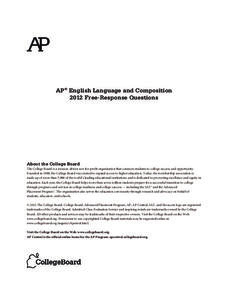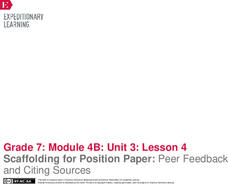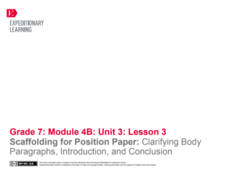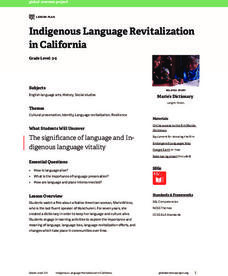Howard Hughes Medical Institute
Creating Chains and Webs to Model Ecological Relationships
The sustainability of an ecosystem depends on many factors and changes constantly. Young scholars consider these factors as they use a set of cards to create food webs. They review key scientific vocabulary such as predator, prey,...
College Board
2012 AP® English Language and Composition Free-Response Questions
Neither rain nor snow nor heat nor gloom may keep postal workers from delivering the mail, but is their livelihood sustainable? A question about the USPS makes up one of the three items in a series of free-response questions from the...
Alabama Wildlife Federation
Mesh Bag Collector
Who knew bugs could be so informative? A hands-on activity has pupils assess the sustainability of a water ecosystem based on the presence of invertebrates. The class places a homemade trap in a local pond, and after several weeks,...
EngageNY
Making a Claim and Advocating Persuasively: Preparing for the Practice Fishbowl
Scholars consider their reading in The Omnivore's Dilemma to develop a claim answering the question, "Which food chain would you choose to feed your family—the local sustainable food chain or the hunter-gatherer food chain?" To guide...
EngageNY
Scaffolding for Position Paper: Peer Feedback and Citing Sources
It's all a process. Scholars watch as the teacher models a peer feedback process. They then carry out the process on their own using the Sustainable Water Management Peer Feedback Form. As a bonus, individuals then participate in an MLA...
EngageNY
Gathering Information about Water Management: Assessing and Reading Internet Sources, Day 3
Water is life! Using the informative resource, scholars first read two informational articles about water management in agriculture. Then, they use a Venn diagram to contrast the different types of evidence authors use to support a...
EngageNY
Forming a Research-Based Claim: Stakeholder Chart on Better Industrial Water Management
It's time to stake a claim! Working with partners, scholars create stakeholder charts for better industrial management of water. As they complete the chart, pupils consider an option for managing water more sustainably, identify...
EngageNY
Forming a Research-Based Claim: Stakeholder Chart on Better Agricultural Water Management
How can industries manage water more sustainably? Building on the previous activity, scholars explore the topic by creating a stakeholder chart for agricultural water management. Next, they participate in the World Café discussion...
EngageNY
End of Unit 2 Assessment, Part 1B: Fishbowl on Better Use of Water in Industry
Listen up, it's time for a Fishbowl discussion! Scholars continue their discussions about water management in industry and agriculture. After hearing both sides of the debate, pupils complete graphic organizers, deciding which sector is...
EngageNY
Using Multimedia in Presentations: Presenting Claims
Visuals help clarify claims. Scholars create visual displays to accompany their end-of-unit presentations about water sustainability. Using blank paper and their notes from the unit, they put their creativity to good use and then...
EngageNY
Scaffolding for Essay: Planning Body Paragraphs for Position Paper This work is licensed under a Creative Commons Attribution-NonCom
Scholars begin creating a plan for their position papers using a Sustainable Water Management Position Paper Planner. They talk with partners about their claims and counterclaims for the essays. Writers then work independently to...
EngageNY
Scaffolding for Position Paper: Clarifying Body Paragraphs, Introduction, and Conclusion
Let's have a talk. Scholars talk through the body paragraphs of their Sustainable Water Management position paper with peers. They take turns explaining their work to one another. They then begin to work independently on the introduction...
EngageNY
Mid-Unit 3 Assessment: Drafting the Position Paper
Organize your thoughts! Scholars work on the drafts of their position papers about sustainable water management. The draft serves as their mid-unit assessment. Before beginning, the class discusses the prompt and then learners work...
EngageNY
Final Performance Task: Sharing Visual Representations of Position Papers
Let's take a stroll! Scholars go on a gallery walk to view the visual representations for the performance task created by the class. They then view a variety of books about environment and sustainability and conduct book talks on the...
Global Oneness Project
Indigenous Language Revitalization in California
A film showcases a Native American woman and her hard work to create a dictionary detailing her tribe's language. While viewing, scholars reflect upon and discuss the importance of language and sustaining cultural identity.
Curated OER
Research Projects in Renewable Energy for High School Students
Thirty-eight pages of information prepares you to assign middle or high schoolers a project on sustainable energy. They take a pretest, review the scientific method, conduct background research, and finally choose an experiment to carry...
Curated OER
El Salvador: How Can My Breakfast Harm the Birds?
Sixth graders explore how their food choices can have an impact on the rain forests. They examine coffee farming and how their techniques can harm birds in the rain forest. Students design two farms with sustainability of bird habits in...
Curated OER
Workshop: Health Challenge
Students conduct Internet research in order to better understand the concepts of sustainable health design. For this design and architecture lesson, students gather data and creat a materials kit that responds to the challenges of health...
Curated OER
Introducing The Cariboo Gold Rush
Students demonstrate appreciation of contributions of Aboriginal peoples, the French, and the British to the development of Canada and explain how supply and demand are affected by population and the availability of resources. They then...
Curated OER
Galaxies
The first thing to note is that this lesson was written for use in a parochial school. Even if you are in a non-religious setting, however, the website exploration of galaxies and the accompanying worksheet make for an engaging...
Curated OER
Management of Commercial Fisheries, Part 2
Students examine the differences between the past vs. the present fishing and the uses of fisheries. In this investigative lesson plan students complete a worksheet and learn to think critically in order to protect our...
Curated OER
The Economics of Organic Agriculture
Students examine how organic agriculture affects farm profitability and how government programs affect organic agriculture. In this organic agriculture lesson students complete an activity on costs and returns.
Curated OER
Waves : An Alternative Energy Source
Students evaluate the feasibility of wave energy as an alternative source of energy. In this alternative energy source instructional activity students are introduced to renewable and nonrenewable energy and study energy production.
Curated OER
Simulation Test
Middle schoolers evaluate an ecosystem and consider how it would respond to varied events. In this Earth science lesson, students work in small groups to analyze an ecosystem's response to teacher created scenarios. Student's...
Other popular searches
- Sustainability Forestry
- Environmental Sustainability
- Ecological Sustainability
- Food Sustainability
- Water Sustainability
- Sustainability the Lorax
- Sustainability of Earth
- Easter Island Sustainability
- Sustainability on Earth
- Sustainability Education
- Sustainability Introduction
- Biodiversity Sustainability

























